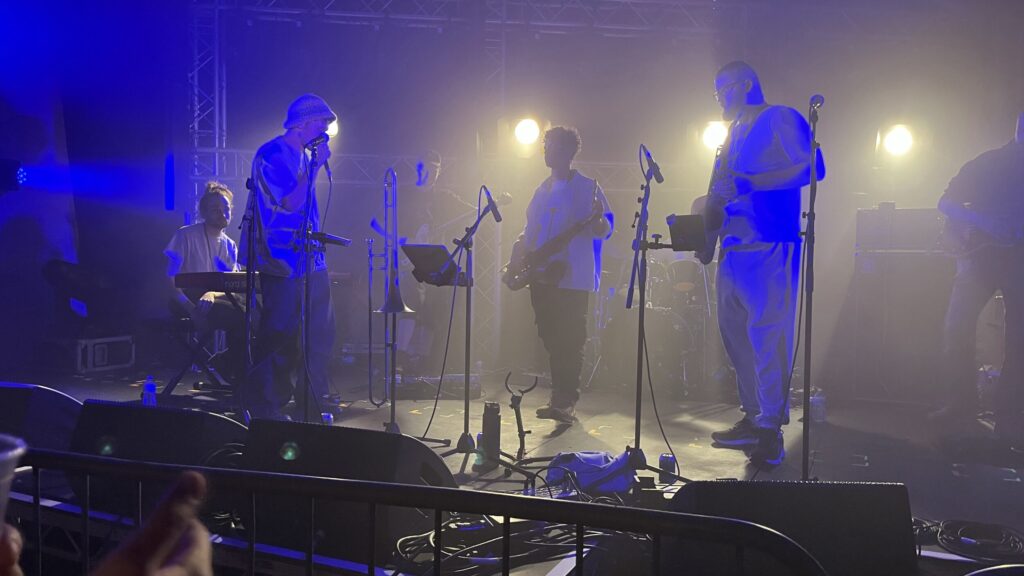British musicians are calling on the Government for intervention as the closure of grassroots music venues threatens the future of UK music production, in what is already an increasingly difficult landscape for artists.
At the beginning of the year, the Music Venue Trust (MVT), which represents hundreds of UK grassroots music venues (GMVs) published its 2023 annual report.
It found the UK lost 13% of its GMVs in 2023, with the number falling from 960 to 835. Venues experienced an average yearly rent increase of 37.5%.
Despite the sector contributing £501m to the economy, nearly 40% of venues reported making a loss last year.
What are GMVs?
GMVs are venues with an average capacity of 300 which give artists the opportunity to learn the craft of live performance and grow their fanbase.
The MVT dictates that to qualify, venues must put on at least 96 shows per year.
For businesses, this can be a costly enterprise.
Founder and director of The Jam Jar in Bristol, Hadie Abido, says a combination of factors lead to narrow profit margins.
“If you have a music venue, you’ve got to block out all the light because if light can get in, sound can get out and you don’t want to disturb your neighbours; have a well-maintained array of equipment; you’ve got to employ someone to book in a band to get that band to the venue. You’ve got a much bigger back of house team.”
The venue hosts artists from all over the world and their events are usually very popular, but profits are still low.
‘Selling out a show, you still lose money on tickets’
Hadie is joining the MVT in calling for a £1 levy to be applied to ticket sales for arena concerts. This money would go straight to a fund that would support the grassroots music sector.
He compares the music industry to football. The Premier League puts hundreds of millions of pounds of investment directly back into grassroots football.
“The Premier League is one of the best leagues in the world and we fund it. We’ve got one of the best music scenes in the world and we don’t fund it.”
What about the artists?
At the heart of the issue are the musicians who rely on small venues to start their career. Divorce Attorney, a newly formed band from Brighton did just that.
“Without them, we wouldn’t be a band. We’d have no benchmark to even see if you’re getting a crowd or if anyone’s listening.”
They say that a lack of focus on the arts has drawn national attention away from the challenges facing artists, venues, and the industry.
“If Government money was going towards enriching the creative arts in our country again, there would be more of a focus on a personal level to go and find what you want to be enriched by.”
Having just formed, the band are at a point in their career where performing gigs is their only way of making money.
For artists further along the pipeline, things are not much easier.
Streaming, which according to the World Economic Forum is how 64% of people consume music, pays royalties based on popularity.
Artist Brownbear estimates that, on average, an artist makes 0.028p per stream on Spotify.
‘What you see is a fraction’
Annabel Whittle, drummer for wonk-pop band Lime Garden, says despite the band signing to a label, releasing an album, and embarking on a European tour, she still has to work multiple jobs to fund her music career.
“All the money you make from Spotify and vinyl sales, you’ve got to half it because half goes to your record label. There’s four of us in our band and our manager gets a cut so what you see is a fraction.”
Annabel does not think increasing the price of streaming subscriptions will solve the problem.
“People don’t value music very much because you’re used to just paying £10 a month for Spotify. To change that back to people paying a bit more – I don’t know if people would be willing to do that. Once you’ve de-valued something, it’s hard to then add value to it again.”
Working as a promoter, she sees how difficult it can be for artists to get signed to a record label in the digital age.
“People in big labels are more apprehensive to take risks on who they sign. In the past, you have gone to gigs and signed someone if you thought they were good. Now, you have to sign people based on statistics and metrics like TikTok and Spotify to see how much engagement people have got. A lot of the time they’ll just sign rising TikTok stars and people who are big online.”
‘It’s not like it was’
Back in 1986, The Woodentops were in the top 100 in the charts with their album Giant. They played the Pyramid Stage at Glastonbury the following year.
Lead singer Rolo McGinty says he is nostalgic for a time when artists were more connected by the gigging scene.
“There are some small pub gigs left but it’s not like it was. It was loads of them – there was place after place.
“There’s an awful lot of people vying for the same spots. It doesn’t feel as open as it was.”
He acknowledges that technology has made music production more accessible.
“It’s easier to make and record and write music than it used to be, but I think that the climate of getting gigs is harsher simply because it’s all economic. People don’t want to take risks.”
What can be done?
The MVT’s founder, Mark Davyd, was one of a number of industry figures who gave evidence to a Culture, Media and Sport Committee inquiry into grassroots music venues in March.
He told the committee that GMVs are “overrun” with people who have had a hit on TikTok returning to smaller capacity venues. After achieving fame quickly, they were unprepared to perform to larger crowds.
Also speaking at the inquiry was Vice-Chair of the Music Managers Forum, Kwame Kwaten. He explained the UK’s biggest artists would not have achieved their success without small venues.
“You don’t get to Ed Sheeran playing two shows last year at the O2 unless he played The Bedford in Balham.
“Unless artists and managers are supported from zero to 1,000-people venues, you won’t reach that level.”
Industry figures are calling for business rates relief and are urging for the £1 levy to be passed.
The Government has been reviewing business rates on GMVs since 2019. Chancellor Jeremy Hunt announced a tax break in the Autumn Budget.
When approached for a statement, Damian Green MP, who sits on the committee, said:
“The evidence the Committee has heard suggests that there are a number of measures that could be used to support grassroots music venues and the musicians who rely on them, including the possibility of a levy on the bigger venues.
“Until we finish hearing evidence it would be premature to reach a conclusion, but I am sure that these venues are an essential part of preserving our great musical culture.”
The MVT also suggests that a fan-led review be carried out to find out what people want from the UK’s live music sector. A similar review was used in football in 2021.
Meanwhile, seven arenas are in the process of being built in the UK, which suggests there is a healthy demand for live music in the country.
Over 23 million people went to grassroots gigs in 2023, according to the MVT, while 30 million attended an arena concert.
Most recently, the MVT announced they will meet with the Co-op Arena in Manchester, which plans to open this month, to discuss the possibility of a £1 ticket levy.
We are having discussions with all major arenas and operators, and once they're safely open we will continue those chats with the Co-op Live too.
— Music Venue Trust (@musicvenuetrust) May 1, 2024
On 7 May, Dame Caroline Dineage MP asked the Treasury for a VAT cut. Chief Secretary to the Treasury Laura Trott MP responded that this will be addressed once the report is published.
The results of the committee’s inquiry are not expected to be revealed for several weeks.









